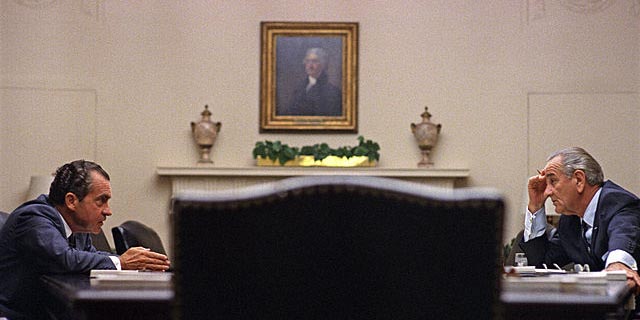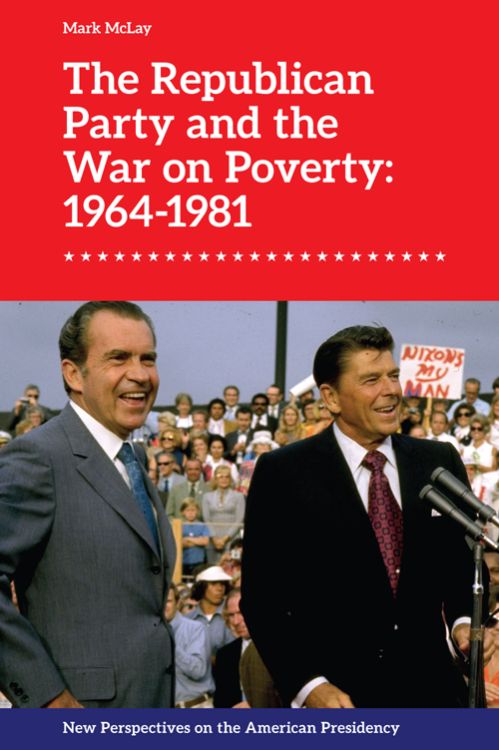

Tell us a bit about your book.
My book is on recent American political history. It examines the Republican Party’s challenge to Democratic President Lyndon B. Johnson’s ‘War on Poverty’. It shows that leading Republicans – most notably President Ronald Reagan – played a crucial role in curtailing the controversial War on Poverty. For Republicans, capitalizing on the War on Poverty’s unpopularity proved a key building block as they sought to return to power during an era of Democratic Party dominance. Since the 1980s, Republicans have continued to enjoy public support for their position that private enterprise is the main antidote to poverty rather than government programmes.
What inspired you to research this area?
I first became seriously interested in US politics during the George W. Bush presidency and was intrigued as to why (at least to my eyes) the Republican Party appeared further to the right than other conservative parties in Europe and Canada.
As I began to research, it became clear that the area in which the modern Republican Party has had the most impact on policy has been in the United States’ approach to the welfare state and poverty issues in general.
What was the most exciting thing about this project for you?
A ten-week research trip to the United States, which had me criss-crossing the country visiting various archives of Republican presidents, senators, and congressmen. Aside from getting to explore the US, this trip formed the bedrock of my research and allowed me to gain a more holistic understanding of the Republican Party in this era and what made the party tick.
Did you discover anything particularly strange or surprising?
Perhaps the most interesting sources I found, but which I couldn’t really use in the book were a series of personal letters exchanged between New York Governor (and leading liberal Republican) Nelson Rockefeller and legendary baseball player, Jackie Robinson. In the mid-1960s, with the civil rights and anti-poverty agenda advancing apace, these letters were warm and mutually complementary. By the late 1960s, amidst a rising white backlash to racial progress, Robinson was clearly disillusioned with the failures of politicians to enact change and with Rockefeller’s own conservative shift. The exchange between them becomes fraught with Robinson expressing his intense disappointment and Rockefeller defensive and somewhat patronising. The letters were a fascinating – albeit quite depressing – example of the death of ‘the Sixties’ promise of racial equality.
Has your research in this area changed the way you see the world today?
Yes, social programmes that are completely associated with one party – that are partisan – are incredibly hard to sustain. The War on Poverty began life as a purely Democratic Party programme (a small handful of Republicans supported it during an era when members of both parties regularly crossed the aisle). This meant that the programme was always vulnerable to a shift in the political winds and the arrival of Republican rule. This was not true of other ‘Great Society’ programmes passed in the 1960s, such as free health care for the aged and broad education spending. A substantial number of Republicans voted for these programmes, and they have continued to grow during both Democratic and Republican control of Capitol Hill.
What’s next for you?
I am co-editing a collection of articles (with EUP) on midterm elections in US history, planning research on polarisation in US society since 1960, and developing a podcast series aimed at History school teachers and students.
About the Book
Mark Mclay examines the part the Republican Party played in shaping and eventually curtailing President Johnson’s War on Poverty. Republican politicians and presidents consistently influenced how the ‘war’ was fought, before President Reagan symbolically ended the effort with his social welfare cuts in 1981.

Mark McLay is Lecturer in American History at the University of Glasgow. He contributed to Constructing Presidential Legacy (Edinburgh University Press, 2018) and published articles in Journal of Political History and Historical Journal.
Enjoy this blog? Check out more here.





